He’s everywhere.
Unless you’ve, say, boarded yourself up alone in a remote, media-free mountain cabin beyond the reach of mail delivery or cell phone towers, there’s no escaping your daily dose of Donald J. Trump.
For most of us, it’s not an easy dose to swallow. There’s the sight and sound of the man himself, orange and blustering; and there’s the distressing litany of policies he promotes, from mass deportation of immigrants to the dissolution of America’s health-care system.
Still, for folks working in the performing arts, the ubiquity of the Presidential Presence carries with it a seed of recompense: the theatricality of it all. Have we ever seen a national leader more addicted to drama, more susceptible to the drug of applause, more willing to accommodate his acolytes with over-the-top performances of the self? There may be little substance to the spectacle of the Trump presidency (aside from whatever dark machinations the Mueller investigation eventually turns up), but anybody with a creative streak and the impulse to entertain knows that there’s fodder here for art.
And for resistance.
A variety of theatres across the country, from Rochester, N.Y.’s Geva Theatre Center in the East, to Mill Valley, Calif.’s Marin Theatre Company in the West, have stepped up to the plate in the first year of this unconventional presidency to address issues, historical and otherwise, that have become freshly relevant since Trump’s ascension to the White House. In a few cases, they’ve mustered the audacity to represent the Donald more-or-less in person, whether or not the play in question calls him by that name.
Naturally, with the American populace sharply divided over Trump’s capacity (even his legitimacy) to serve as president, such programming presents a challenge for theatres whose audiences may have wildly diverse opinions about the politics of the moment. Is it a bad idea, for some companies in some locales, to proffer strongly critical or satirical views of Trump and the ideas he promulgates? Have there been walkouts? Cancelled subscriptions? Bad press?
Certainly, in the headline-grabbing case of last summer’s Julius Caesar at the New York City’s Public Theater—in which director Oskar Eustis fashioned his version of the Roman ruler as, in the words of New York Times critic Jesse Green, “a petulant blondish Caesar in a blue suit, complete with gold bathtub and a pouty Slavic wife”—there was a price to pay for flavoring Shakespeare with a strong dash of 2017. Eustis’s “onstage Trump-trolling” (Green again) cost his theatre one of its highest-profile donors, Delta Air Lines (and caused another, Bank of America, to take its name off the production), prompted angry tweets from the White House, and generated outrage among conservative media outlets. A shot across the bow?
No doubt. But the leading playwrights and directors (including Eustis) responding to an American Theatre field-wide query shortly after last November’s election seemed solidly united behind the idea that theatre’s role is to help shape and direct the nation’s inevitably contentious post-election national conversation. Amid a rich array of commentary (available online at americantheatre.org), playwright Christopher Shinn offered a view that seems widely shared: “The theatre has to confront us with new, unexpected, and radical points of view. This may be uncomfortable and even unpleasant, but it’s necessary.”
Multiple productions at U.S. theatres this season aim to do just that. Let’s drop in on some of them and talk to the artists involved about what they hope to accomplish—and the potential consequences of speaking truth to power in the age of Trump.
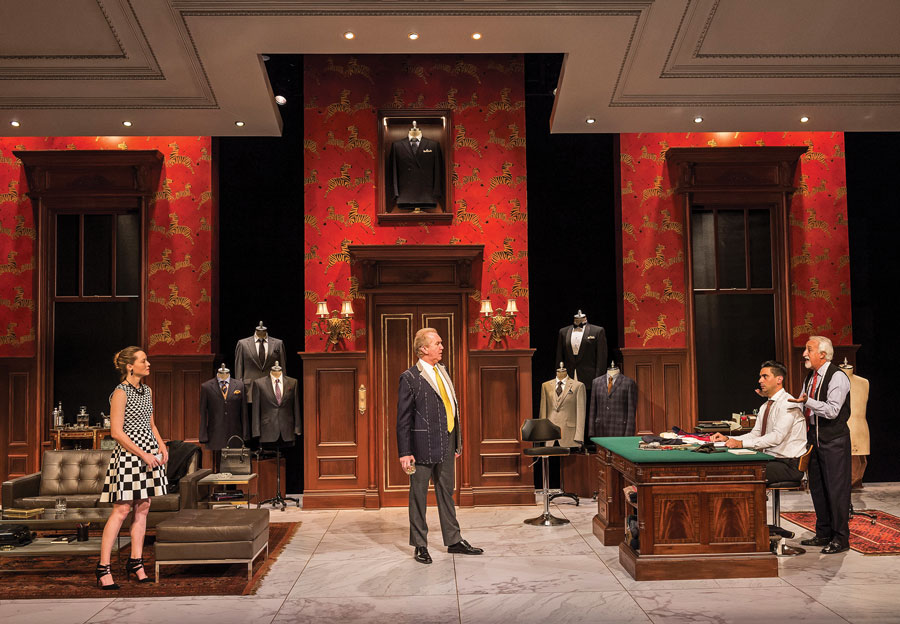
To note that Jon Robin Baitz’s newly expanded play Vicuña & an Epilogue is personal is something of an understatement. On the night of Trump’s inauguration, the award-winning playwright (Other Desert Cities) and TV writer (“Brothers & Sisters”) was violently assaulted during a demonstration in Washington, D.C., by one of the new president’s supporters. Baitz’s sharp-toothed satire Vicuña, featuring a thinly disguised real estate tycoon seeking a handmade wool suit for his second televised presidential debate, was running at the time at Los Angeles’s Kirk Douglas Theatre, in a well-heeled production staged by Center Theatre Group and directed by Robert Egan.
Now Baitz has amended Vicuña, attaching a fictionalized account of his real-life assault—suffered in the script by an opinionated Iranian tailor’s apprentice named Amir—as an epilogue to the play. The expanded Vicuña runs Nov. 1-26 at Mosaic Theater Company in Washington, D.C., with Egan again at the helm.
Baitz’s Trump surrogate in Vicuña is loose-cannon candidate Kurt Seaman, embodied by Harry Groener in L.A. but played in D.C. by John De Lancie (“Star Trek: The Next Generation,” “Breaking Bad”). Alongside the ambitious Iranian tailor, Amir (Haaz Sleiman), supporting characters include the politician’s devoted but disillusioned daughter Srilanka (rhymes with what?), who struggles to soften her dad’s hateful invective, and, adding to the irony, a female Republican senator and party chairman who is reduced to vainly offering Seaman an enormous bribe to drop out of the election.
Is the epilogue there to heighten Vicuña’s relevance? Responds Baitz flatly, “I don’t think playwrights should use words like ‘relevance.’ What I do think is that the epilogue offers a mournful appraisal of the dystopia ignited by the election of Kurt Seaman. The epilogue takes place far later, in a broken America that is fiscally, emotionally, spiritually, and morally bankrupt. It’s not a literal epilogue, but rather more of a Kaddish—a prayer for the dead.”
Why steer the play in so grim a direction? “In the months since the election,” Baitz laments, “the country has continued to fracture itself, the divisions have grown more stark, the landscape more perilous. In my epilogue there are ghosts and regret, a form of purgatory, and invocations for the end of the American experiment, which I feel is in danger of ending with a small, squalid, angry whimper.”
The new epilogue, Baitz adds, “ends with a question—one that was asked on a loyalist propaganda poster for the Spanish Civil War: ‘What are you doing to prevent this?’ That’s our challenge now that we’re left here whistling in the dark. Now what?”
Mosaic founding artistic director Ari Roth shares Baitz’s dark assessment of the times we live in, but he is nevertheless elated to be presenting to his D.C. audiences a piece the Los Angeles Times described as “so hot off the press that it almost singes.”
As Roth puts it, “We’re deriving sizable energy from responding with fact-based art in the face of belligerence. That’s really the key dynamic this season: beyond political resistance, what animates us is cultural resistance—drawing together as a diverse body, inspired by art, to reflect on who we are and what’s at stake.”
Baitz’s twisted rendition of Trump World may be full of comedic references and joshing, but “this is not a spoof,” wrote reviewer Neal Weaver in his remarks on the Los Angeles production. Vicuña is “probably the most lethal, ruthless, and comprehensive satire/indictment of a politician ever penned by an American playwright,” Weaver went on to declare, noting ominously that “if Baitz was not already on Trump’s enemies list, he probably will be now.”
In fact, Baitz already has plenty of competition. If you’re Karen Zacarías, there may be some compensation in knowing that your name, alphabetically speaking, would likely be toward the bottom of any such list. Mexican-born, D.C.-based playwright Zacarías (Mariela in the Desert, Native Gardens) took up the cause of so-called Dreamers well before Trump turned the fate of these undocumented American youngsters into political ping-pong. Her well-received documentary-style drama Just Like Us, which tracks the coming-of-age of four Latina youngsters grappling with their immigration status, debuted at Denver Center Theatre Company in 2013 and has been produced around the country since. Then, one day after Trump made his media case for the planned end of the DACA program this past September, Zacarías responded by making her play available royalty-free to any organization that wishes to produce it or employ it in their programming.
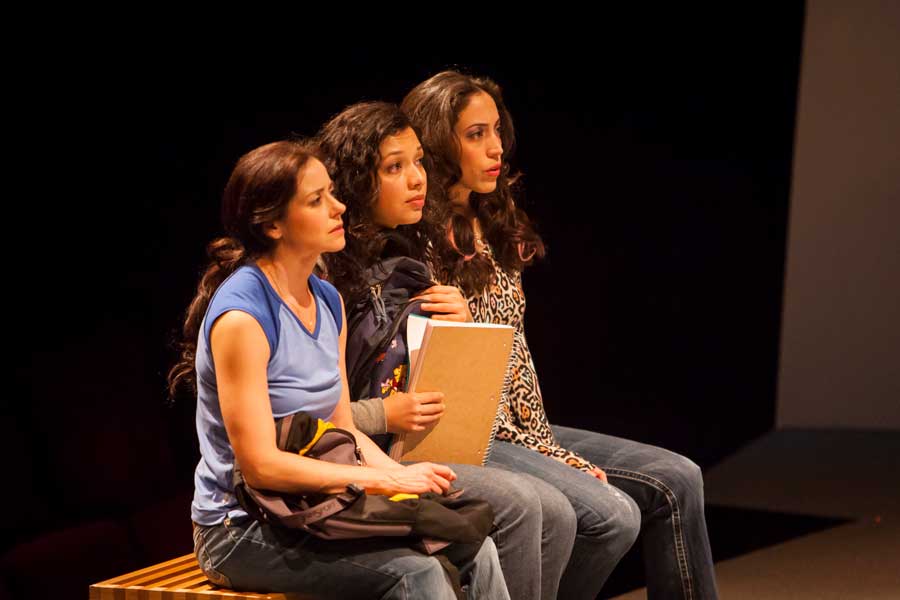
“I was so upset with the decisions Trump made about immigration that I went rogue and just said, ‘Take my play—please!’” Zacarías avows with a laugh. To date she has personally responded to more than 200 requests for the script, and her declaration has resulted in stagings or readings of Just Like Us not only at theatres (including such major companies as Providence, R.I.’s Trinity Repertory Company) but at colleges and universities (Georgetown University, George Mason University, the University of North Carolina, Princeton University); in high school and middle-school settings, and by such unexpected parties as a coalition of immigration lawyers.
“This is a trigger topic,” figures Zacarías, who was brought to the U.S. as a child and, though never undocumented, faced the possibility of her own parents’ deportation when she was 22. “There has been a lovely grass-roots response, using the play as a platform for discussion. It’s a way to contextualize this debate in a more complicated, sophisticated way—to understand what’s at stake on a human and intellectual level.”
Another playwright with immigrant ties, Romanian-born Saviana Stanescu (Aliens with extraordinary skills), has been throwing shade on Trump’s abandonment of Dreamers with similar tactics. She and a clutch of writer colleagues—Chiori Miyagawa, Mia Chung, Jessica Litwak, and Andrea Thome—have fashioned a script called Dream Acts, and, like Zacarías, they’re taking their message on the road. The push began as early as 2011, when the five women writers joined forces to interview Dreamers and turn their stories into a 15-minute-plays; these were later interwoven into an evening-length text. Staged readings, panel discussions, and performances at HERE in 2011 and NYU’s Skirball Center in 2013 were prep for their current Dream Acts campaign.
“This issue is so painfully actual again, now that Trump has threatened the end of DACA,” Stanescu observes. A full-cast reading of Dream Acts, under her direction, and a panel featuring Dreamers and their supporters got the ball rolling at Downtown Manhattan’s New Ohio Theatre in late September, as part of a pop-up festival focused on “black, brown, queer, and radical artistic/political voices.” More such events, Stanescu promises, are on the way.
The fears and aspirations of Dreamers also serve as compelling raw material in Deferred Action, a muscular collaboration between Dallas Theater Center and its smaller neighbor, Cara Mía Theatre Company. Co-authored by Cara Mía A.D. David Lozano and DTC’s director of new play development, Lee Trull—and developed with the consultation and feedback of local Dreamers and immigration experts—Deferred Action traces the twisty journey of a fictional youth from San Salvador named Javier Mejia, from his early childhood to his emergence as a grown-up celebrity activist for the DACA cause in North Texas.
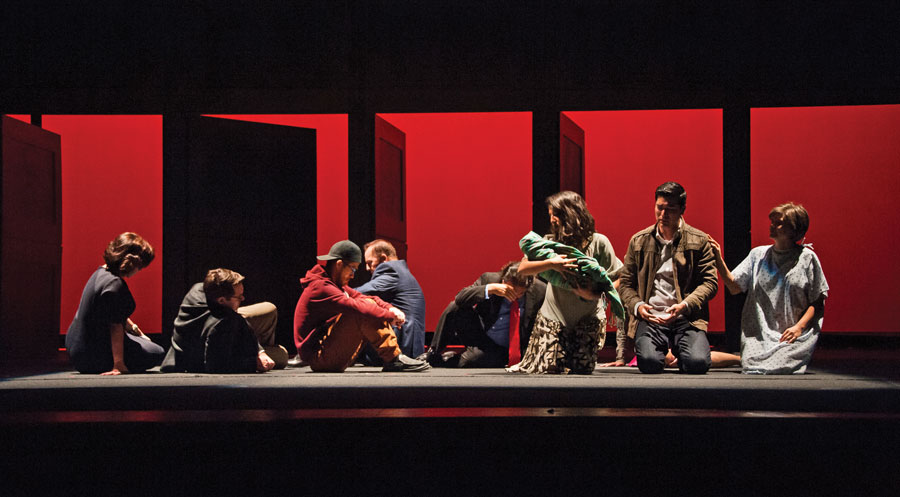
The play’s timeliness has only intensified since its appearance in 2011, and its successful run earlier this year at DTC engendered lively debate among audiences and in the press. Lozano is organizing an upcoming regional tour that begins with a run at Southern Methodist University and continues to Denton, Texas, then to Los Angeles, where it’s slated for the Latinx-focused Encuentro de las Americas International Theatre Festival, running Nov. 2-19. “This is the largest project Cara Mía has ever undertaken,” Lozano maintains.
DTC artistic director Kevin Moriarty spearheaded the Lozano-Trull writing matchup, a case of, as Moriarty puts it, “our large, heavily resourced theatre and a smaller, culturally specific company” productively joining forces. Texas, Moriarty notes, ranks second in the nation to California in numbers of undocumented citizens; at the same time, the state’s Republican-led administration has led legal opposition to DACA and its implementation.
That conundrum puts Texas, in the words of Dallas-based arts activist and reporter Alexandra Bonifield, “in the eye of the immigration hurricane.” Deferred Action, she ventured in an American Theatre essay about the production, “might be seen as a lightning flash from the approaching storm.”
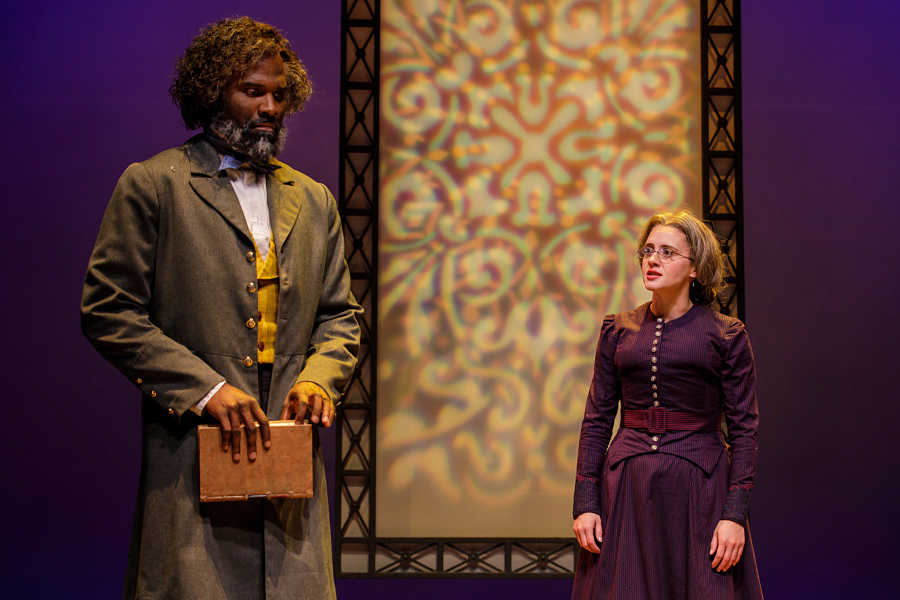
Storms ignited by Trump are swirling around a cluster of additional hot topics. The President’s ill-considered remarks following a violent white supremacist rally in Charlottesville, Va.—including his defense of extant monuments to Robert E. Lee, Stonewall Jackson, and other Confederate figures, and his offhanded indictment of U.S. founding fathers for their participation in slavery—has transformed plays like Thomas Bradshaw’s new work Thomas and Sally into templates for public debate.
Bradshaw’s much-anticipated riff on the relationship between Thomas Jefferson and Sally Hemings, the enslaved woman who mothered six of his children—in its world premiere, Sept. 28-Oct. 22 at California’s Marin Theatre Company, with that company’s A.D. Jasson Minadakis at the helm—is “a work of historical fiction,” the playwright insists, although he has populated the play with supporting figures like Ben Franklin and John and Abigail Adams.
“I present the characters without judgment and let their hypocrisies live alongside each other, without trying to explain how these contradictory elements can co-exist,” says Bradshaw, whose plays often startle audiences with their characters’ shocking unpredictability or casual depravity. “We know a whole lot about Jefferson, but very little about the Hemings family,” he says of his research, which depended heavily on “firsthand accounts from modern descendants of Jefferson and Hemings, describing what’s been passed down through the generations of their families. Still, no one actually knows what kinds of conversations they had. I’ve done my best to turn their story into a realistic narrative.”
Another playwright, Bradshaw’s Illinois-born and widely traveled colleague Mat Smart (The Royal Society of Antarctica), has trained his eye on a different resonant historical relationship, that of Susan B. Anthony and Frederick Douglass. Smart’s new play The Agitators, which tracks the sometimes tempestuous exchanges between these two 19th-century icons of activism over a span 45 years, is currently running through Nov. 12 at Upstate New York’s Geva Theatre Center (which co-commissioned the play with funding from the New York State Council on the Arts), with Logan Vaughn directing.
Smart notes that Trump’s faux pas about Douglass (to whom the President referred in public remarks as though the famed abolitionist were still alive) came long after his script was complete.
“The thing that drove me to the subject of this friendship, other than the fact that it hasn’t been widely written about, is how Anthony and Douglass worked together so closely, despite a couple of major fights they had with one another about legal precedents and civil and human rights issues,” the playwright observes. “But they kept getting back into the arena with each other. What worries me so much about the current climate is that the Left and the Right aren’t talking to one another—they’re getting further and further apart. The lesson we can draw from this friendship is the importance, the necessity, of staying in the room when we disagree. It’s become a play about how we help each other to see.”
Smart expects that Geva audiences will feel what he does about the Anthony-Douglass connection: “It’s both incredibly inspiring, but at the same time depressing, that the words of both these figures are so relevant today.”
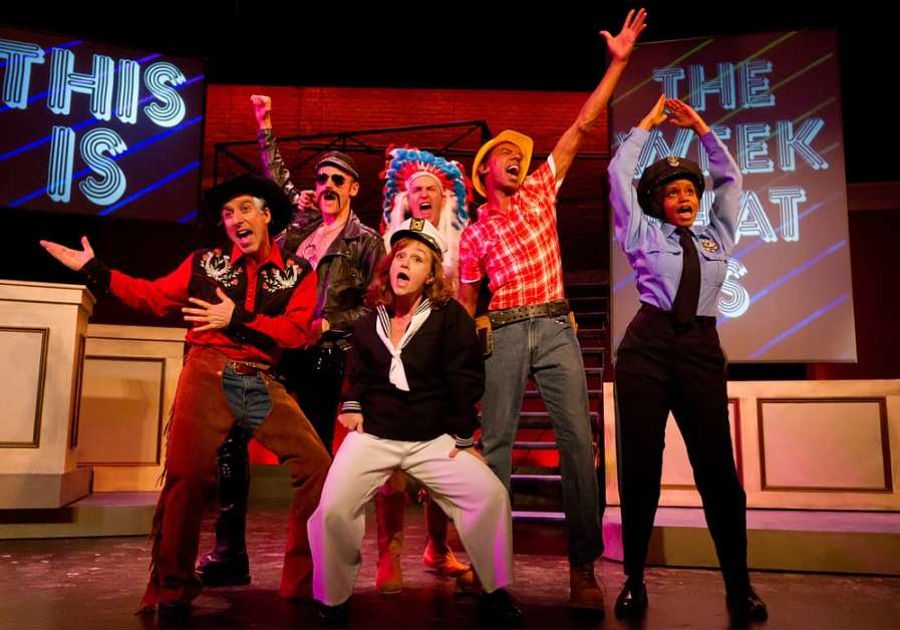
There’s another, more immediate brand of theatre—ensemble comedy, especially parceled out in serial increments—that is making hay from the chaff generated by Trump and company.
This Is the Week That Is, the venerable comic revue that has become a signature yearly offering of 1812 Productions of Philadelphia, makes no bones about the rich comic possibilities of contemporary politics. Here’s how the show’s new season, its 12th, is being touted on the troupe’s website: “1812’s annual political comedy is taking off the gloves and getting ready to hop in the ring with the most unpredictable administration in modern history. Get ready to laugh. Bigly.”
The Week has not shied away from tough topics in the past. Sketches about Planned Parenthood, gun control, even the flagging quality of the Philly education system have managed to turn audiences’ misgivings into chuckles and belly laughs. But for this year’s Nov. 24-Dec. 31 run, how will the show’s performance team fit Trump into their all-comedy-all-the-time package?
“We think of our show as sort of ‘Carol Burnett’ meets ‘The Daily Show,’ live onstage, and every year gives us the opportunity to take the temperature of the country,” says 1812 co-founder Jennifer Childs, who has been the company’s sole artistic director since 2006. “Where are we? What are people talking about? The material is all political in nature, so we have to update our news sketches sometimes daily in response to what’s going on.
“Last year Trump the candidate was a major figure in the show, but certainly Trump the president is a bit of a different commodity!” Childs concedes. “He can’t be just ‘that wacky Prez!’ We have to acknowledge the danger that this person is, and tackle some of the baggage he brings with him.”
Will a company actor play the man himself? “No,” Childs says without hesitation. “We’ve decided that won’t get to the heart of the satire we’re creating. Anybody can ‘do’ Trump—we want to do things that can’t be done on TV or by Alec Baldwin. I’ve actually been playing around with the idea of having a series of inanimate objects auditioning to play Trump!”
Were there negative reactions to last season’s lampooning of the Orange Don? “Well, yes and no,” Childs equivocates. “We pride ourselves on being equal opportunity offenders. Obviously, the company is left-leaning, as is a majority of our audiences, but we have a significant number of Republicans on our board and among the audience. Most of them took it in good fun. I always say that if you’re doing political satire and you don’t piss anybody off, you’re not doing your job.
“But,” she adds, “every year, there will be an angry e-mail or two, somebody waiting after the show to offer their views, or someone who speaks up at talkbacks to object. For me, what’s great about that is that we’re starting a conversation—I’m heartened when people make the effort to air their views. That’s a positive sign.”
The bottom line, Childs concludes, is that “when people are laughing, they’re open—they’re ready to take in new information. This will be our first time doing the show since Trump became President, and I’m hopeful that people haven’t lost their sense of humor in the interim.”
We can also hope, it might be wise to add, that the nation’s theatregoing citizenry hasn’t lost the capacity to respond with open minds and open hearts to the growing critique on American stages of a presidency that may prove historic for all the wrong reasons.
Jim O’Quinn is the founding editor of American Theatre magazine.


